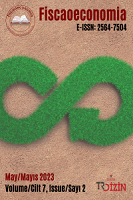Tarım Sayımları Çerçevesinde Tarım İşletmeleri ve Kullanılan Arazi Büyüklüğündeki Değişimin Bölgesel Yansımaları
Regional Reflections of Changes in Agricultural Enterprises and the Size of Land Used Within the Framework of Agricultural Census
Author(s): Akif DincerSubject(s): National Economy, Micro-Economics, Agriculture, Economic history, Political economy, Socio-Economic Research
Published by: Ahmet Arif Eren
Keywords: Agricultural Structures; Small Businesses; Incorporation in Agriculture; Turkish Agriculture; Capitalist Agriculture;
Summary/Abstract: Since the 1980s, neoliberal policies adopted by the impositions of international institutions and the European Union have created pressure for the liberalization of the agricultural sector of underdeveloped countries and reshaped their national agricultural policies in this direction. The new process, which started in the 1980s, turned to various efforts to make the phenomenon of corporatization in agriculture dominant in the agricultural sector of underdeveloped countries. While the capitalist transformation in Turkey's agriculture was shaped in line with the views of the IMF, WB and WTO after the 1980s, it progressed in 2005 in the context of the negotiation process for full membership to the EU. These policies first imposed on Turkey have emerged as the redefinition of agricultural policies as company-oriented policies and the removal of all supports in agricultural product and input markets. According to the regional results of the 1991-2019 agricultural censuses, in the Aegean, Istanbul, Marmara, Central Anatolia and Mediterranean Regions, where small production is common, the majority of the unused agricultural lands belong to small-scale enterprises. Some of the lands belonging to these enterprises have been the property of large-scale enterprises, and some of the lands have been the subject of various projects (HEP, highway, airport, housing, tourism) as a rent area with the support of the government. The majority of the unused lands in the East and Southeast Regions belong to large-scale enterprises. While the environment of violence in the 1990s played a role in the inability to cultivate agricultural lands in the Southeast, agricultural lands were the subject of various rent projects in the 2001-2019 period. This study examines the capitalist transformation of Turkish agriculture and the regional effects of this transformation on agricultural production, agricultural structures/peasants.
Journal: Fiscaoeconomia
- Issue Year: 7/2023
- Issue No: 2
- Page Range: 1557-1590
- Page Count: 34
- Language: Turkish

